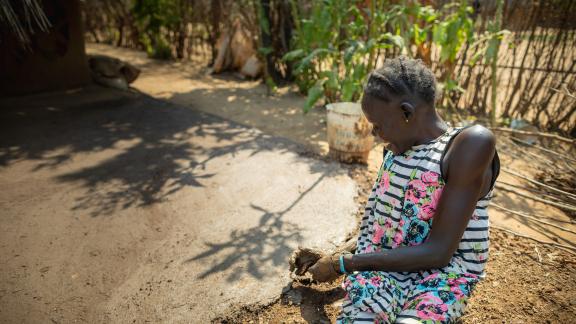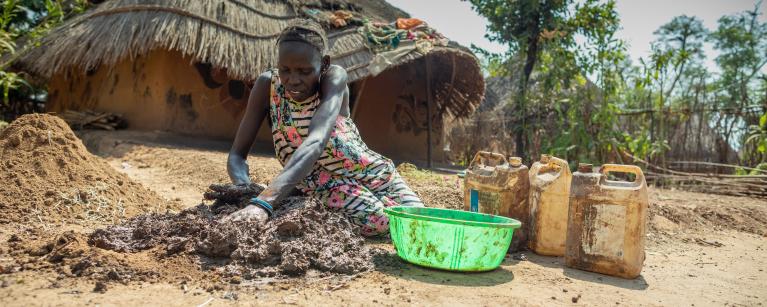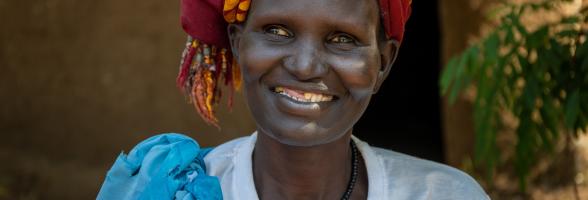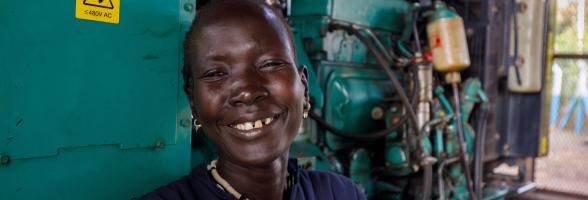Under the 38 °C hot sun, Nyalok Alo, 27 is hard at work. With purpose etched on her face, she mixes sand and water to cement the front of her makeshift home at Kule refugee camp in Gambella, Western Ethiopia. Paying no mind to the heat, Nyalok continues making improvements to the small hut which she and her family calls home.For Nyalok, this is a labour of love, all in anticipation of the 2023 Christmas holidays. It may seem like a small task, but to her —her two children and elderly mother—it is the little semblance of normalcy that brings them happiness.
Life hasn't been easy for Nyalok. A single mother of two and living as a refugee with a disability from a past accident, she fled the turmoil of South Sudan in 2014 with nothing but her elderly mother and two children by her side. "I come from Nasser in the Upper Nile state of South Sudan," says Nyalok adding that "during the war, we had to flee to Gambella. It was a tough journey with many dangers along the way due to conflict, but it was a closer option, and given my disability, Gambella was a good option.”
Like many, the journey to Gambella was long and treacherous. “We walked tirelessly, but we finally made it. "We were registered at the border and resettled here at Kule refugee camp."
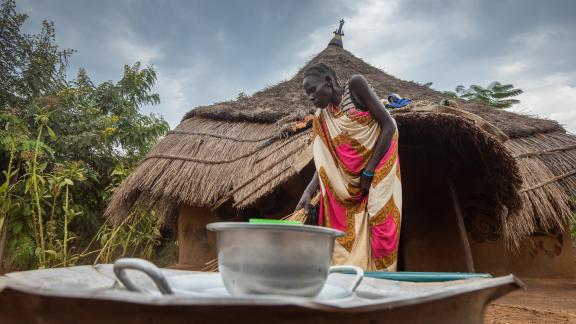
Gambella is home to nearly 400,000 refugees forced from their homes in 2013 and it is one of the least developed and remote places in Ethiopia. Comparing life in Gambella to their past in South Sudan, Nyalok reflects on the stark differences. Her daily struggles are compounded by the lack of proper healthcare facilities and the constant threat of insecurity "Back home, we had our farms, our businesses. But here, as refugees, our options are limited, especially for someone like me, with a disability, it's challenging to do heavy activities such as walking longer distances to access water, or longer distances to fetch firewood due to my situation.”
Yet amidst the hardships of camp living where there is little in the way of comfort, Nyalok finds solace in the little blessings. "Having water nearby, thanks to Oxfam, has been a blessing," she says with gratitude. "I used to walk long distance, nearly two hours to access water and I could only carry 10 litre due to my back injury; it was not easy. I’m so happy I now have water closer to my home even if it's for just an hour a day, I’m grateful”.
However, while the water system in Kule provides relief for Nyalok, it risks exacerbating her situation due to the dwindling funds to maintain the aging water infrastructure which has been operational since 2014. "The water supply is becoming increasingly unreliable," Nyalok notes with worry. "And without proper access to clean water, our health is at risk and would mean walking even longer distances to access this precious commodity”.
Oxfam has been supporting refugees in Gambella with clean and safe water for drinking since 2014, however due to the dwindling funds as well as aging infrastructure the existing water supply system is proving insufficient to meet the existing needs. This is turn leads to potential water scarcity and compromised access to clean water. On some days, the water system can barely deliver 5 to 6 litres of water per person which falls far short of the required standards of 15 L per day.
Despite the challenges, Nyalok is grateful for the water at her doorstep and her job is to ensure her children and elderly mother have access to water for drinking and sanitation. Her primary concern remains providing food for her family. "We rely on whatever we can find, but it's not enough. For the last eight months, we were told food was suspended, so nothing has been coming, forcing us to pick and eat leaves from the forest," says Nyalok.
“We rely on whatever we can find, but it's not enough. For the last eight months, we were told food was suspended, so nothing has been coming, forcing us to pick and eat leaves from the forest.”
As more refugees come to Gambella due to drought, floods and conflict, the strain on resources only grows. "It is tough," Nyalok says, her voice tinged with concern. "But we hold onto hope, hoping for a better tomorrow."
As the day draws to a close, Nyalok and her mother huddle together, preparing their evening meal, the first and only one of the day for her family and herself. “We are used to this, we just need a meal to survive because we cannot risk not saving enough for the next day, so this is our breakfast, lunch, and dinner” explains Nyalok pointing at the green basin that her mother is preparing while she gets the fire ready.
For many who have sought refuge here, it is a haven from conflicts that have not only uprooted them but also claimed the lives of their loved ones. Despite the hardships, there is hope that things will get better and may one day return home.
